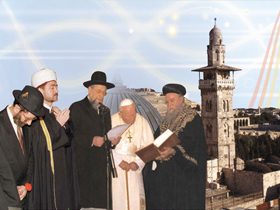There is not one of the People of the Book who will not believe in him before his death; and on the Day of Resurrection he will be a witness against them. (Surat an-Nisa':159)
The great majority of commentators and scholars agree that the pronoun “his” in the term qabla mawtihi (before his death), points to the Prophet Jesus (pbuh). Arabic linguistics also agree with this view.
The plural suffix hum is used in all the Qur'anic verses concerning the People of the Book (e.g., Surat al-Bayyina:1 and 6, and Surat al-Hashr:2). In this verse, however, the singular suffix hu is used. This means that the People of the Book will believe in the Prophet Jesus (pbuh) before his biological death after he returns to Earth.
The phrase "and on the Day of Resurrection he will be a witness against them," is one of the proofs that the verse does refer to the Prophet Jesus (pbuh). That being the case, the verse should be interpreted in these terms: "When the Prophet Jesus (pbuh) comes, all People of the Book will believe in him." This indicates that the Prophet Jesus (pbuh) will return and that true religious moral values will rule Earth under his leadership.
Allah reveals that all the prophets and messengers will bear witness for their communities on the Last Day. However, Allah reveals in the Qur'an that "There is not one of the People of the Book who will not believe in him before his death" only in the case of the Prophet Jesus (pbuh). Moreover, Allah does not use such an expression in the Qur'an for any prophet who came before the Prophet Jesus (pbuh) and in whom the People of the Book believed. No similar account is offered with regard to the Prophets Abraham, Solomon, David, Moses, Joseph, or Jacob (peace be upon them all).
If every member of the People of the Book were to believe in the Prophet Jesus (pbuh) before his or her own death, then a similar case would have been revealed with regard to the other prophets who were sent to them. However, this expression is employed only in relation to the Prophet Jesus (pbuh). Therefore, it is another important proof that the Prophet Jesus (pbuh) differs from other prophets.
As we have seen, the “his” in the expression before his death is evidently the Prophet Jesus (pbuh). It is impossible to interpret the verse, as some people have, in a way that indicates that "Each member of the People of the Book will believe in the Prophet Jesus (pbuh) before they die." Some of the Jews, a People of the Book, tried to kill the Prophet Jesus (pbuh) because they did not believe in him. They later continued in their disbelief and believed that they had killed him.
The great majority of Islamic scholars share this view. Abu Hurayrah and Ibn `Abbas, both of whom were Companions of the Prophet (may Allah bless him and grant him peace), also stated that this verse indicates his second coming. Al-Qurtubi interprets the verse in the following terms:
When the signs of the Day of Judgment draw near, when the Prophet Jesus (pbuh) returns alive from the sky to Earth, all members of the People of the Book who are alive will believe in him. All there will be is the Islamic nation.
Al-Tabari interprets the verse thus in his Commentary:
When he returns to Earth to eliminate the antichrist [make him ineffective], every one of the People of the Book will believe in the Prophet Jesus (pbuh) before his death. At that time, all nations will become a single nation under the name of Islam.
In his account, Khalil Herras stated that al-Tabari's interpretation is accurate and that Surat an-Nisa':159 is evidence of his second coming:
The pronoun “he” in the verse refers to the Prophet Jesus (pbuh). When he returns, every living member of the People of the Book will believe in him, affirm him, and only Islam will be accepted from them as their religion … The People of the Book will believe in the Prophet Jesus (pbuh) when he returns to Earth…
 |


